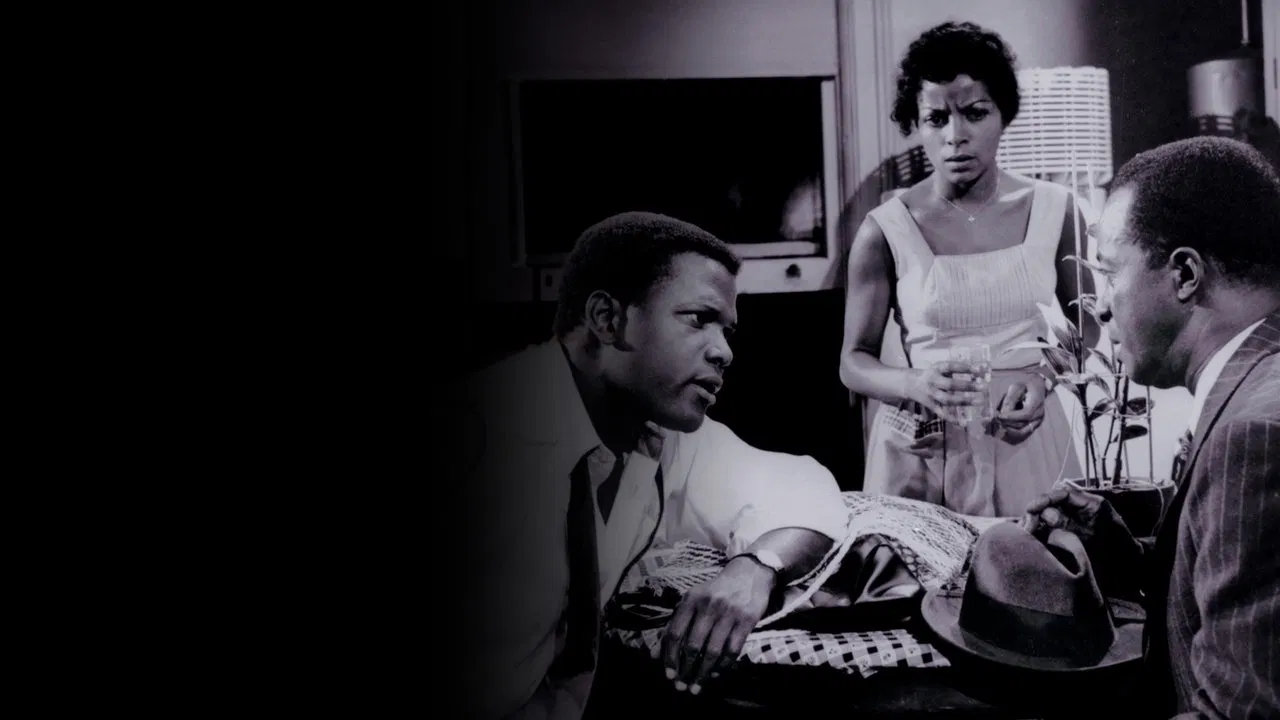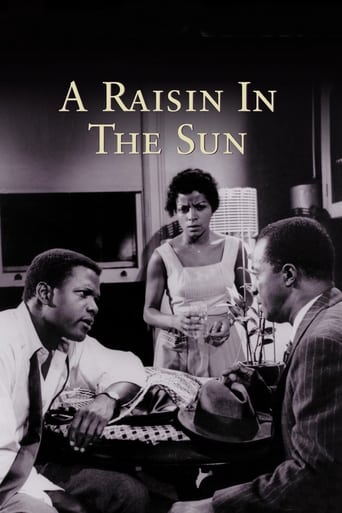

Slow pace in the most part of the movie.
... View MoreA Disappointing Continuation
... View MoreVery interesting film. Was caught on the premise when seeing the trailer but unsure as to what the outcome would be for the showing. As it turns out, it was a very good film.
... View MoreThe film makes a home in your brain and the only cure is to see it again.
... View MoreIt's hard enough to make it in this world as a white man without money, let alone being a black man on the outside looking in. For the superb Sidney Poitier, he's imploding inside his insecurities of being a failure in the eyes of his family and be able to truthfully call himself a man. He's married to the hard working Ruby Dee who loves him with all her soul, but a distance she doesn't understand has grown between them. Poitiers's sister (the enigmatic Diana Sands) is also striving to better herself, attending medical school and trying to "express herself" with a variety of hobbies she dumps once bored with them. A slap across the face from family matriarch Claudia McNeil after taking the Lord's name in vain only briefly wakes her up. This is a black family in changing times losing their way, and it's up to the no-nonsense McNeil to bring them all back together. Repeating her Broadway role and commanding every moment on screen, Claudia McNeil is award worthy as the heart and soul of her family. She loves her two children unconditionally but no longer understands them. That's why she has made Dee her confidante and training to take over as head of the family. A scene where she sentimentally talks about her dead husband reveals the truth inside the soul, admitting the man's imperfections, but loving him long after he's dead just the same.The plot line surrounds the fight over an insurance check McNeil is waiting for, with Poitier spending somebody else's money even before they get it. Poitier wants to buy a liquor store, while McNeil wants to buy a house so the family (which includes Poitier and Dee's young son, Stephen Perry) can move out of the slums. But this creates many issues, not of which the least is the white neighbor's desperate attempts to prevent them f on moving in. A timeless tale of how dreams exist in everybody's life, no matter the age, this has had two hit Broadway revivals since the beginning of the millennium, spawned an unofficial sequel ("Claybourne Park") and even been musicalized. It is a powerful character drama where a man is revealed to have not really grown up, the women who strive to help him even when it seems that he's beyond help. McNeil may not like what her children become, but her nurturing heart pulls the family together. A climactic breakdown in Poitiers's character may be the wake-up call he needs to become a real man, just like a wake-up call that sobers up a drunk. This is one of the all time classics and one that deserved more award attention in 1961 than it got.
... View MoreI know that he eventually won for "Lilies of the Field", but I feel it's conceivable that the Academy may have rewarded him the Oscar as compensation for past works he did that genuinely deserved recognition. Films like "The Defiant Ones" and THIS MASTERPIECE were both Oscar worthy, but in those days, needless to say, giving a black man the Oscar wasn't something people JUST DID. To this day, we have problems with diversity at the Oscars, BUT LET ME GET TO MY REAL POINT. This movie is well-acted all across the board! Everyone in this film did beyond great. You could actually feel the pain and frustration of every character; especially Sidney's character Walter Lee. If not already, this film needs to be reserved in the Library of Congress. Not only is it that good, but it's so relevant to American history. If you love classic dramas, this is one for the ages. See it!!!!!
... View MoreDaniel Petrie perfectly adapts Lorraine Hansberry's play about an African-American family in 1950s Chicago. We see how the desperation of their existence drives every member of the family to do rash things, and how they have to fight racism every step of the way.Watching the movie, it struck me how "A Raisin in the Sun" must have looked when it debuted on Broadway, and then in cinemas. You see, this movie depicts not only an African-American family, but also a man from Africa, who helps the sister start thinking seriously about her heritage, and so she begins saying things that I would have expected to hear from Malcolm X. Moreover, the husband (Sidney Poitier) asks the sister's friend about why he wears "faggoty-looking white shoes". By that point, how many movies had employed derogatory language, much less anything about homosexuality? Without a doubt, this has to be seen as one of the movies representing the new path that cinema was taking in the 1960s, focusing more on real-life issues than escapism. And it is definitely one that I recommend. Also starring Ruby Dee, Diana Sands, Claudia McNeil, Roy Glenn, Louis Gossett, Ivan Dixon and Stephen Perry.
... View MoreA Raisin In The Sun, is an absolute gem of a film. The plot revolves around a black family's determined fight, to escape poverty. The Younger family is headed by stalwart Matriarch, Lena Younger. Lena shares her run-down tenement apartment in Chicago, with her son Walter, his wife Ruth, their son Travis, and Lena's daughter Beneatha.After her husband dies, Lena is entitled to receive a tidy sum of insurance money, that her husband had willed to her. The rest of the family, also eagerly awaits the arrival of Lena's insurance check. Especially Walter, who wants Lena to use some of the money, to help him start his own liquor store. Lena decides to use some of her insurance money, to buy a modest home in an all-white neighborhood, and to donate the rest of it, to her local church. Walter is crushed by Lena's decision. Lena later decides to give Walter some of the money, to give him a chance to realize his dream of owning a business. But Lena soon regrets her decision to give money to Walter, after he loses it, because of his crooked business partner. Lena and her family, must also decide if they really want to move into a white neighborhood. Especially after white homeowners there, try to offer the Youngers lots of money, if they agree not to move into the neighborhood. The entire cast of this film, is positively magnificent. Especially Sydney Poitier as Walter Younger. Sydney conveys Walter's anguish, with an amazing depth and clarity. This is Sydney's best film, and a must-see for his serious fans. Claudia McNeil is perfect in her role, as the strong-willed Lena Younger, who acts as the Younger family's moral compass.This powerful, moving film, is unforgettable. And I highly recommend it, to anyone who loves classic American drama films.
... View More